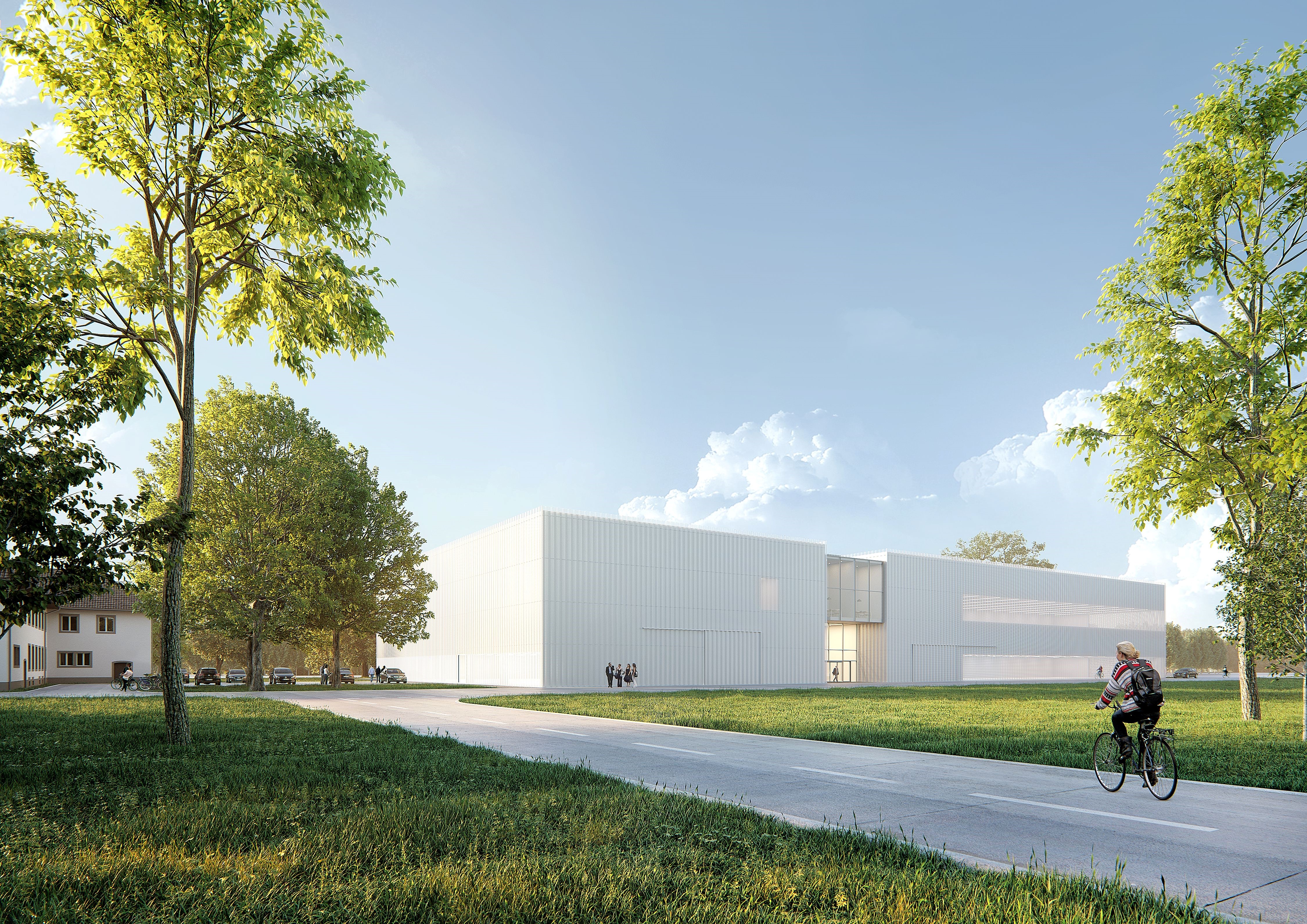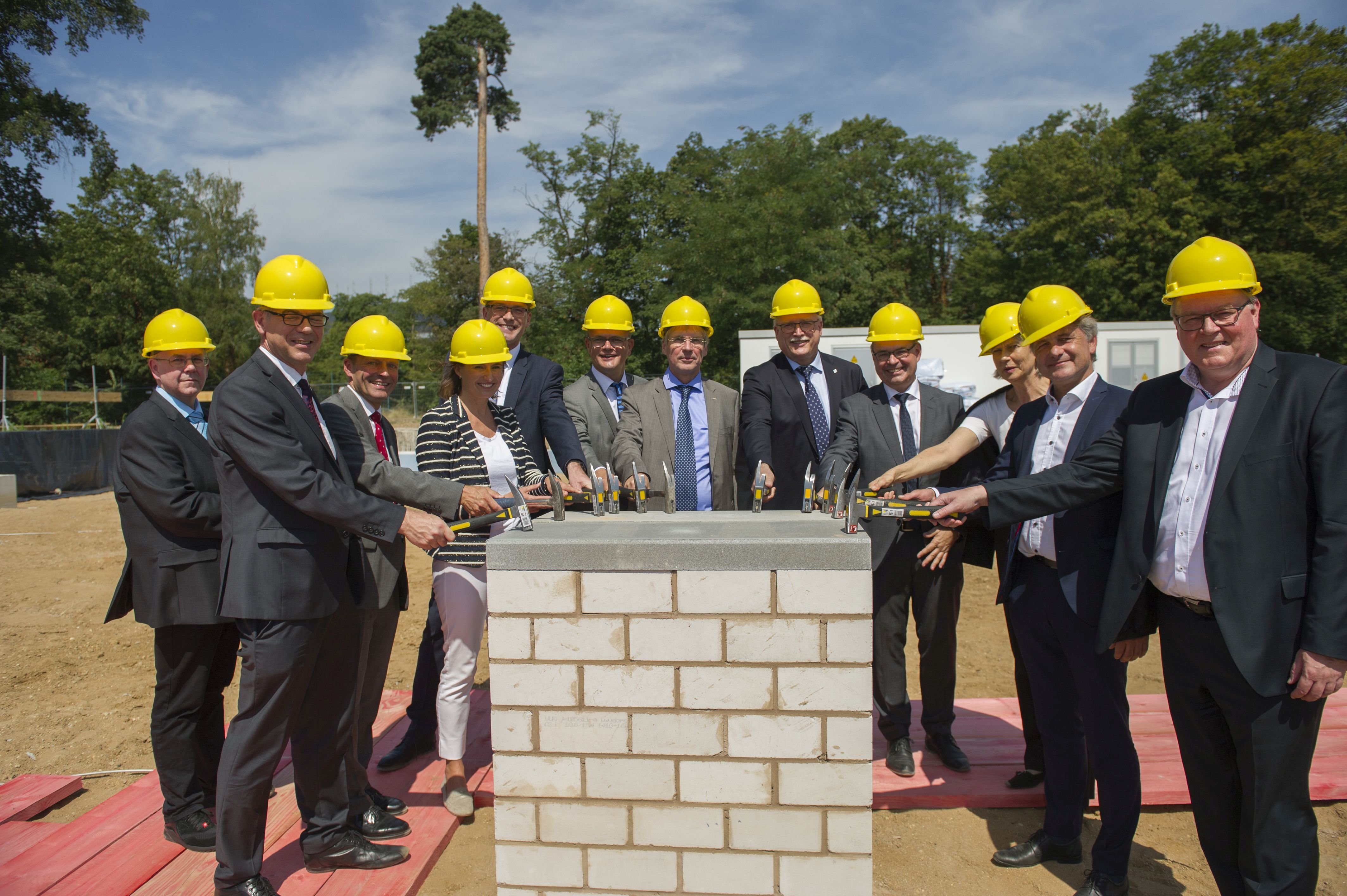Laying of the foundation stone of the Karlsruhe research factory fuels vision of self-learning production
Cooperation of KIT and Fraunhofer
Based on digitization, artificial intelligence and machine learning, science and industry are working together to transfer new, challenging production processes from the drawing board to operational practice in the shortest possible time: that is the vision of the Karlsruhe research factory. In the presence of more than 100 guests from industry, politics, and science, the Karlsruhe Institute of Technology (KIT) and the Fraunhofer-Gesellschaft (FhG) today celebrated the laying of the foundation stone for the joint project. From the end of 2020, researchers and company representatives intend to start work in the research factory.


After the ground-breaking ceremony in December 2018, a project of great importance for the innovative strength of Germany as a business location has now reached its second milestone: After today's laying of the foundation stone on KIT Campus East, the Karlsruhe Research Factory - a development and demonstration center for the factory of the future - is on its way to completion. Starting at the end of 2020, new production technologies are to be planned, tested, and transferred to industry much faster than before.
"The Karlsruhe Research Factory creates the unique opportunity to research the future topic of intelligent production on real processes in a practice-oriented way," said KIT President Professor Holger Hanselka. "Together, the partners KIT and Fraunhofer contribute their comprehensive expertise in the fields of artificial intelligence, mechanical engineering, process technology, sensor development, and sensor integration to create added value for strong, innovative companies.
Professor Alexander Kurz, Executive Board member of the Fraunhofer-Gesellschaft for Human Resources, Legal Affairs, and Exploitation, praised the broad, cooperative approach: "With this joint project, KIT and the Fraunhofer-Gesellschaft are pooling their research in Karlsruhe in the field of future, innovative production technologies and methods. The concept of involving industry as well as the further development of research up to academic education is best implemented with the joint approach".
"Breaking new ground in many respects"
State Secretary Katrin Schütz from the Baden-Württemberg Ministry of Economic Affairs, Employment and Housing emphasized the benefits for the regional economy: "The Karlsruhe research factory will be a beacon for Baden-Württemberg as a center of innovation. In order to further consolidate our status as the number one innovation region in Europe, we must bring new technologies into operational use as quickly as possible. The research factory will significantly accelerate this process".
"The Research Factory will break new ground in several respects", added Ulrich Steinbach, Head of Department at the Baden-Württemberg Ministry of Science, Research and the Arts. "It is an excellent example of the joint research of KIT and the Karlsruhe Fraunhofer Institutes. For example, they are researching how to achieve high-quality results at a very early stage - i.e. when the manufacturing processes required for a new product may not yet be fully understood. In this way, we are laying a further foundation stone for new technologies from Baden-Württemberg.
On the way to agile production
With this ambitious goal in mind, two strong research institutions have jointly initiated and will jointly operate the Karlsruhe Research Factory: On the one hand, the KIT with its wbk Institute for Production Engineering headed by Professor Jürgen Fleischer, on the other hand, the Fraunhofer-Gesellschaft with its Institute for Chemical Technology ICT - represented in particular by its deputy head and holder of the professorship for lightweight construction technology at the KIT Institute for Automotive Systems Technology Professor Frank Henning - and its Institute for Optronics, Systems Engineering, and Image Exploitation IOSB headed by Professor Jürgen Beyerer, who also holds the professorship for Interactive Real-Time Systems at the KIT Institute for Anthropomatics and Robotics.
At the laying of the foundation stone, the three mentioned scientists and Dr. Olaf Sauer from Fraunhofer IOSB as coordinator of the project on the part of the Fraunhofer-Gesellschaft explained how the research factory is to achieve the set goals by means of "AI-integrated production": "State-of-the-art digitization methods, artificial intelligence, and machine learning enable us to plan and test new production technologies significantly faster and, above all, to transfer them to industry at an early stage. In joint joint projects with industrial companies such as "SMiLE - System Integrative Multi-Material Lightweight Construction for Electromobility" or "MoPaHyb - Modular Production Plant for Highly Resilient Hybrid Components", KIT and Fraunhofer have already gained a wealth of relevant experience.
The aim is to achieve agile production, i.e.: High-quality products already come off the assembly line while the associated production process is still being optimized. The goal of agile production is to significantly shorten the "time-to-market" - sometimes by several years. This enables innovative companies to place new products on the target markets much earlier than before.
Cooperation with industrial partners
The scientists at the research factory want to find out how this can be done and, together with industrial partners, transfer it into applications. In line with their claim "Optimizing established processes - strengthening immature processes", they are focusing on the maturation of a production process on a laboratory scale, the start of production on the machine on an industrial scale and, finally, the continuous monitoring and improvement of ongoing production. All three phases are supported in the research factory by machine learning and artificial intelligence methods. The KIT and Fraunhofer researchers are driven by the vision of not only making individual production steps agile, but also expanding entire process chains into an internally communicating, self-learning system.
The methodology of rapid industrialization of new production technologies to be developed at the Karlsruhe Research Factory promises decisive advantages in global competition for the numerous innovative companies in Baden-Württemberg. In order to transfer results quickly and in a targeted manner, interested companies should therefore be involved right from the start - through close cooperation, joint projects and workshops. "In particular", say the initiators and future operators Jürgen Fleischer, Frank Henning, Jürgen Beyerer and Olaf Sauer, "we will be devoting ourselves in the coming years to lightweight construction and new production processes for the mobility of the future. The industry is undergoing a major change. The rapid market launch of new systems, methods and processes will be crucial for maintaining the competitiveness of our country".
Key data on the Karlsruhe research factory
A total budget of about 15 million euros has been earmarked for the construction of the research factory located on KIT Campus East. The cooperation partners KIT and Fraunhofer each contribute half of this amount. The same applies to investments in the initial equipment of the production halls, laboratories, and offices in the amount of probably 2.25 million euros. After the opening planned for the end of 2020, the research factory will accommodate about 70 scientists on two floors and an area of 4 500 square meters. There will be 50 workplaces available for industrial partners as well as office space in the immediate vicinity.
Fields of application of the research factory are electromobility and lightweight construction, but also other innovative fields for which intelligent and economical production technology must be established using Industry 4.0 and AI methods.
The project is funded by the Federal Ministry of Education and Research, the Ministry of Science, Research and the Arts Baden-Württemberg, the Ministry of Economics, Labor and Housing Baden-Württemberg and the European Fund for Regional Development.
About the participating institutions:
As "The Research University in the Helmholtz Association", KIT creates and communicates knowledge for society and the environment. Its goal is to make significant contributions to global challenges in the fields of energy, mobility, and information. To this end, about 9 300 employees work together on a broad disciplinary basis in the natural sciences, engineering, economics, humanities, and social sciences. KIT prepares its 25,100 students for responsible tasks in society, economy, and science by means of a research-oriented university study program. KIT's innovation activities bridge the gap between knowledge and application for the benefit of society, economic prosperity, and preservation of our natural resources.
With more than 26 600 employees and an annual research volume of 2.6 billion euros, Fraunhofer is the largest research organization for application-oriented research in Europe. The fields of research are geared to the needs of the people: health, security, communication, mobility, energy and environment. That is why the work of Fraunhofer researchers and developers has a major impact on people's future lives. With creativity, technology that is designed, new products and improved processes, Fraunhofer invents the future.

Weitere Materialien
Last modified:
 Fraunhofer Institute of Optronics, System Technologies and Image Exploitation IOSB
Fraunhofer Institute of Optronics, System Technologies and Image Exploitation IOSB